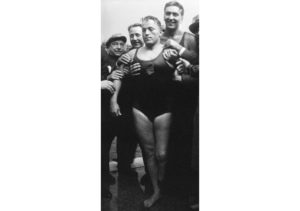I hope you don’t mind these POVs being so long and wordy cause I really enjoy writing them. In the second chapter, I’d like to explore what makes people acknowledge a certain activity as a sport, furthermore what drives them to do it?
I was sitting by the pool with a good friend of mine as we watched a former co-worker doing laps in the light of the setting sun. We tested a special ball earlier and found that there is probably too much salt in it. The ball converted any momentum into a deep dive after a meter which was the longest achieved pass distance as well. Topped with the lack of fitness and long missed years, we quickly ended up chilling by the side. Behind us, the pools of the magnificent clinker brick cubes, the Hajós Swimming Complex, were all abandoned except for the one used by the national polo team. My ambitions felt almost funny in such a direct comparison. Still I was filled with excitement.
My theories below are based mostly on the thoughts of Steven Pinker and Barabási Albert-László, two inspiring scientists researching networks through the numbers of the world and the words of speech and thought. I understand it’s impossible to provide an exact definition of what sports are so I’d just invite you on a mental journey with some observations and theories along the way.
Let’s kick off with George Orwell’s cynical quote about serious sports,
” […] it is war without the shooting.”
For him, serious sports represented the darker side of mankind. He boiled the sporting spirit down to violent competitiveness. Would you agree with Orwell’s grim tone? Even if competition would be the most important element of activities to qualify as sports, you could consider it a civilizational advance that we are able to act out violent urges to create hierarchy in a playful and controlled manner. On the other hand, we are attracted to controversy and complexity, admiring the ambiguous landmarks of our progress as humans with the most pride. Other species also exhibit traits like the ability to play or to create an order of dominance based on non-lethal competition. The dance of colorful birds is superior to a flatland bmx jam or figure skating and syncro swimming events in terms of eco-friendliness and artistic impression.
Violence continues to preoccupy the mind throughout life. According to independent surveys in several countries by the psychologists Douglas Kenrick and David Buss, more than 80 percent of women and 90 percent of men fantasize about killing people they don’t like, especially romantic rivals, stepparents, and people who have humiliated them in public. People in all cultures take pleasure in thinking about killings, if we are to judge by the popularity of murder mysteries, crime dramas, spy thrillers, Shakespearean tragedies, biblical stories, hero myths, and epic poems. (A character in Tom Stoppard’s Rosencrantz and Guildenstern Are Dead asks, “You’re familiar with the great tragedies of antiquity, are you? The great homicidal classics?”) People also enjoy watching the stylized combat we call “sports,” which are contests of aiming, chasing, or fighting, complete with victors and the vanquished.
Pinker also finds sports rooted in similar fields like Orwell, and claims that it’s in our very nature to do sports. We are compelled to do so as the human brain developed functions over time which make humans players in various senses of the word. Pinker points out an interesting function of our brains which acts like a cheater-detector that works in any game, within any preset rules. Probably the innate mastery of game theory proved itself to be handy as we suddenly found ourselves to be a highly intelligent, social species over the short course of couple hundred-thousand years, capable of both altruism and deceit.
The Wikipedia-standard definition of sports adds two more criteria to competitiveness to inspect, self-improvement and entertainment. In reality, it is the last aspect which all games get measured by and get justified or denied as a sport in the eyes of the public. Even a decade ago, popularity rankings of sports were based on the size of their businesses. Based on barely traceable, incomprehensibly huge revenues. Entering the age of information made the measurement of popularity easier and conversion of publicity and money more effective and convenient. Tell the game to sell the game.
But sports are so much more than just a health-industry with highly profitable and shady top levels.
Water polo is life.
Basketball – more than a game.
How many kids and adults dedicate their life to a sport as an athlete or a fan, with the dedication being it’s own and only reward?
Imagine if someone walked up to you and started asking you why you do any sport you do. Assuming you know nothing else other than this person is seriously questioning why you do what you, I think you may even feel offended in your freedom to spend your time as you wish and keep that to yourself.
Lacking spectators for decades, UWR did not really exist in the public eye and yet it was kept very much alive by dedicated players. Understanding the motivation of these players or really anyone’s is quite difficult but it’s necessary if you’d like to provide people convincing reasons why try the sport you recommend.
If I could give a piece of advice to aspiring UWR players here, know why you play. And don’t assume others play for the same reasons. I know why I’ve tried UWR – I simply have a curious personality and a taste for new. But the reasons I’ve stayed around for, I’m still exploring after a decade into the sport.
Where does the drive come from, if there is seemingly no reward?
Let’s take a look from a bit of a distance, what it means to play a sport?
Training for cooperation and competition through playing. Accepting rules of which some can be bent, others can be broken and some are strictly kept with sanctions. We improve ourselves with any amount of participation, but the rewards can be multiplied by talent or dedication.
In short, sports train for life. While they do that, they also model life. All sports are deeply embedded in culture and have tremendous effects on societies. They are barely compared to fashion, even though showing traits similar to fashion. Ever gazed at the waves of reinvented means of human transportation? Sports have periodic shifts in what the mainstream’s taste just like anything else. There is a constant increase in interest as we are able to show the game underneath the surface better and better. Noone could predict the boom when English or Chinese speaking mainstream media would give a detailed cover of the sport, but based on the trends it is inevitable and the more prepared we for such drastic increase of interest, the better.
Albert-László Barabási gave me advice once which I’ve found simple and beautiful. As a matter of fact, I met him by pure luck, I was delivering his book about success as a bike messenger.
Life tends to be a little more complicated than theory. But his case studies offer two important observations I’d like to remark here:
1. the speed at which information becomes available around the globe is comparable to the speed of light.
2. information is the only resource we can endlessly multiply.
To tell stories of UWR, what we do and why we do it, is a resourceful way to highlight and benefit the sport.
At this point, we have to admit that most people have no idea UWR exists. When approaching anyone, I also have to admit, underwater rugby is no solution to any of the world’s real problems. It’s just an awesome game. But if it gets you moving, if it makes you care a little more about yourself and others… It was worth the trouble bringing it to you.




